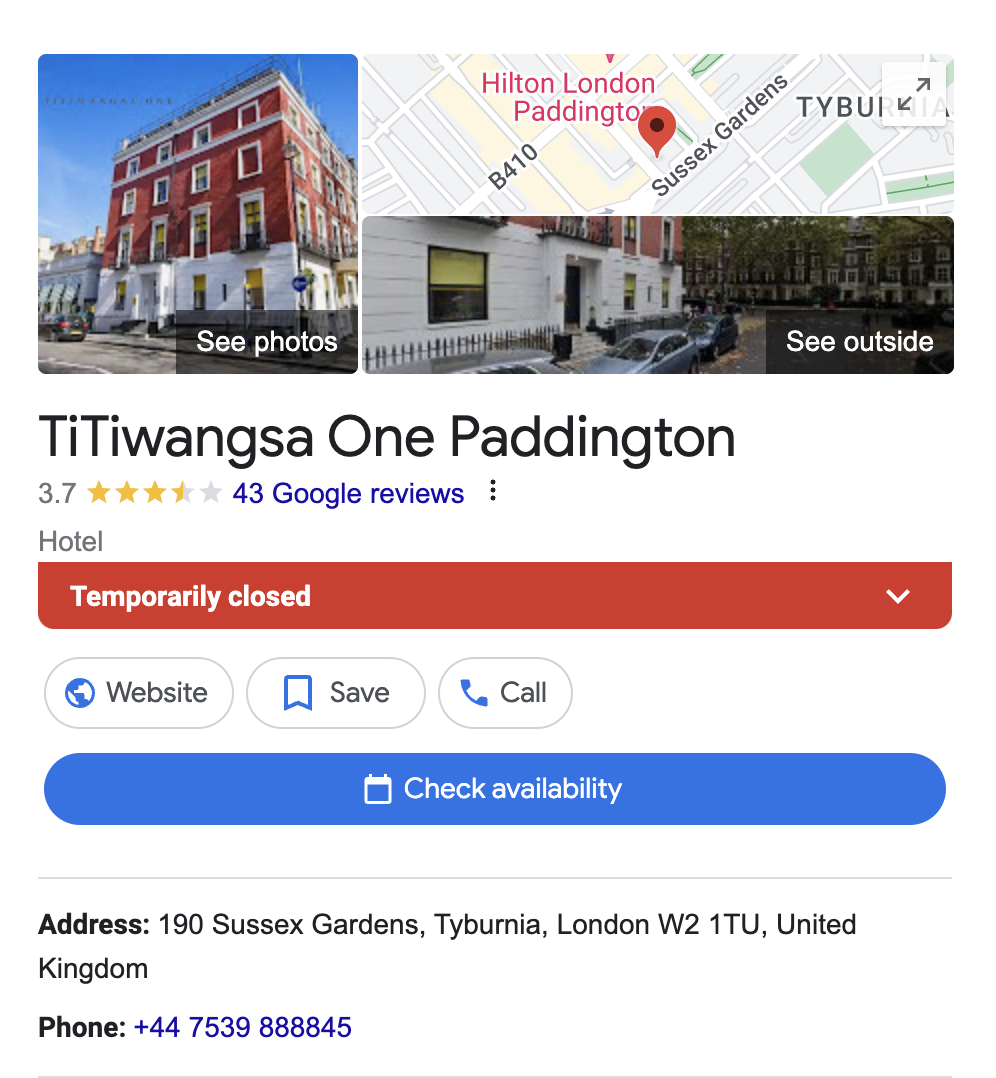This traveler’s Booking.com mistake cost her $9,200
Heather McKay made a mistake while browsing Booking.com — a big one that ended up costing her $9,200.
Instead of comparison shopping, as she intended, McKay accidentally made a prepaid, nonrefundable hotel reservation for an extended, 70-night stay.
A confirmation email from Booking.com sent just moments after she’d made the accidental reservation alerted her to her mistake.
Hoping to correct her error quickly, McKay ignored the warning screen that advised her of a 100% penalty for her nonrefundable reservation and reflexively pressed the cancellation button. That action triggered an even more shocking message from Booking.com: The hotel reservation was canceled, but she had forfeited the $9,200 that all those nights had tallied up to.
Since that moment six months ago, McKay has been on a frustrating, unsuccessful mission to reclaim her money.
After exhausting all possible avenues to a positive resolution, McKay turned to TPG for help. She hoped we could shine a light on her plight and convince Booking.com to return her $9,200.
I hoped so, too, but as you’re about to read, that request would turn out to be a tall order.
Browsing Booking.com for a potential trip
Last August, McKay discovered that her daughter might be going to England for an internship next summer.
“There was nothing confirmed, but I got curious,” McKay recalled. “So I went onto Booking.com to do some preliminary research. I wanted to know how much a hotel would cost around that time.”

Daily Newsletter
Reward your inbox with the TPG Daily newsletter
Join over 700,000 readers for breaking news, in-depth guides and exclusive deals from TPG’s experts
Having used Booking.com previously, McKay says she was aware of how the platform functions, so that’s why what she says happened next is a bit unexplainable.
Entering some random dates and time frames, McKay zeroed in on a hotel with a great rate and in the right area.
“It’s called Titiwangsa One Paddington,” she told me, an apartment-style hotel near Paddington Station. “I wanted to know what the total cost would be,” she continued, “so I clicked a button that I thought would convert the British pounds to dollars with tax. I never meant to press a confirm button.”
But she had, in fact, just accidentally booked (and paid $9,200 for) 70 nonrefundable nights at Titiwangsa One Paddington — a hotel she knew little about but was considering for her daughter’s hypothetical stay during an unconfirmed potential internship.
Trying to cancel her Booking.com mistake
Records show that McKay pressed that confirm button at 8:30 a.m. local time. Less than a minute later, at 8:31 a.m., Booking.com’s first email arrived.
To McKay’s horror, the message indicated that her Bank of America credit card had just been charged $9,200 for a long-term stay at Titiwangsa.
“When [the confirmation arrived], I was shocked,” she said. “I didn’t intend to book the hotel. I don’t even know if my daughter will be going to England. The dates I added were just random. I was just browsing and gathering information.”
A mere three minutes after Booking.com sent the confirmation email, at 8:34 a.m., McKay tried canceling her reservation, hoping that would be the end of this fiasco. Although McKay saw the nonrefundable cancellation terms, she assumed there must be a grace period, sort of like many airlines offer, during which her mistaken reservation was eligible for a refund.
She soon found out that there is no grace period for nonrefundable reservations made on Booking.com.
Asking Booking.com for help correcting this mistake
McKay assumed the pending $9,200 charge that was visible in her online credit card account would fall off later that day, but just to make sure, she called Bank of America. She says an agent assured her that her assumption was correct, so when the charge moved from pending to confirmed, McKay was only mildly concerned.
“I assumed it was a fluke, but I immediately called Booking and explained that I had canceled this reservation right after I accidentally made it,” McKay recalled.
That’s when the repercussions of what McKay had initially thought was an easily correctable booking mistake began to come into focus.
“The agent at Booking.com told me that my reservation was nonrefundable,” McKay told me. “She said I canceled, and no refund was owed.”
Unable to believe that she could have possibly made a $9,200 irreversible booking mistake, McKay hung up and called back. This time, she asked to speak to a supervisor and hoped there was still a chance that this problem could be easily fixed.
However, that agent reiterated the same information as the first one: McKay had agreed to the prepaid, nonrefundable terms of the reservation and then canceled of her own volition. Booking.com could not override those terms. However, the owner could opt to.
The Booking.com supervisor advised McKay to contact the owner of Titiwangsa and ask for a goodwill gesture.
Asking the manger of Titiwangsa for a refund
McKay took that advice and called the property in England and asked to speak to the manager. She explained her error and hoped the person on the other end of the line was a reasonable human being.
McKay soon found out that Titiwangsa’s management had no intention of refunding her money — or allowing her to reinstate the reservation so she could at least make the most of her mistake.
“I even had a lawyer friend follow up and, in the friendliest way, ask him to reconsider his decision. The answer was no,” she said. “When I asked if we were welcome to stay during the 70 nights on my reservation, he said I had no reservation since I had canceled it.”
A credit card dispute isn’t the answer to this booking problem
When neither the property nor Booking.com agreed to cancel McKay’s hotel reservation without penalty, she turned back to Bank of America — her credit card company.
“I called Bank of America and the agent told me that I could file a credit card dispute,” McKay told me. “So I asked her to begin the credit card dispute and the $9,200 was temporarily returned during the investigation.”
Unfortunately, a credit card dispute is not the way to handle a self-created booking mistake. The Fair Credit Billing Act protects credit card users against billing errors and fraud but not user error.
In this case, there was neither a billing error nor fraud. McKay had made a mistake with this booking, and that wasn’t in question. Because of that, there was very little chance of success in disputing the charge.
Soon, McKay received a notification from Bank of America that because she had willingly booked the hotel and then canceled, per the terms of the reservation, she had lost the dispute.
McKay’s $9,200 was now back in the hands of the hotel.
Asking TPG for help fixing this booking mistake
After the attorney friend of McKay’s phoned the hotel a second time and was unable to convince the owner to either refund the $9,200 or at least let her reinstate the reservation, McKay was about to give up.
But then she got one more idea: to ask TPG for advice and assistance.
“The hotel owner refused to even discuss reinstating the reservation. Now he stopped taking our calls,” she said. “I don’t know if you can get my money back, but it seems like there should be some consumer laws to protect against this type of thing.
“If I can’t get a refund from Booking.com,” she continued, “at least I hope TPG will warn others about this. There should be at least a 24-hour cancellation period on a site like Booking.com.”
We have to agree with McKay on that. There should be a 24-hour cancellation period on hotel bookings — just like with airfare purchases. That would be consumer-friendly. Unfortunately, there isn’t.
However, McKay’s situation was so shocking — and outrageously expensive — that I decided to ask Booking.com to reconsider its stance on her reservation.
Will Booking.com reconsider refunding this reservation?
I reached out to our executive contact at Booking.com about McKay’s case. This is not a customer-facing person but an executive I can communicate with as a member of the media and a consumer advocate.
Here’s an excerpt of my email to Booking.com
“… Is this hotel owner really allowed to refuse to honor the reservation as well as keep the money even though he was alerted of the mistake just (4) minutes after it was made?
That doesn’t seem very consumer-friendly … this customer did make multiple errors. I don’t know why she did, but she was on the phone just minutes after she pressed confirm. Can Booking.com put pressure on this hotel owner to at least honor the reservation? The actual booking says it’s not refundable but the dates can be changed one time. Can anything be done here for Heather?
Michelle Couch-Friedman, Consumer advocate”
Before long, the same helpful Booking.com executive whose team saved the day for another TPG reader with an overwater bungalow fiasco got back to me — but this time, with bad news.
“Hi Michelle,
Our team understands mistakes can happen, but on the Booking.com platform, all prices and information on pricing for properties are readily available on the Property Page without having to book anything.
The customer stated in her correspondence to the team that she merely wanted to confirm the total amount of the reservation’s costs in USD and her intention was to never actually book. This was never necessary because on the Booking.com platform, you can easily adjust the language and currency in which you wish to view the site.
These options are found at the top of the platform website. That said, our support team did reach out to the accommodation partner to allow waiving the cancellation fees associated with the costs of the reservation. The partner declined this request given that the guest booked a nonrefundable room with a nonrefundable policy.”
Although I was disappointed with the response from Booking.com, I wasn’t surprised. Booking.com is a listing platform. The company doesn’t own the properties, nor does it create the terms and conditions of the individual travel providers.
Except in cases of outright deception by a property owner, Booking.com must adhere to the policies that are on display for each consumer to read carefully before hitting that confirm button.
Asking Bank of America to have another look
When Booking.com was unable to force the property owner to reinstate the reservation, I turned to Bank of America.
The hotel had fought McKay’s original dispute citing that she was free to use the reservation, but according to the owner, that was no longer the case. Despite, McKay’s request to have the reservation reinstated, he refused. So, I hoped Bank of America might change its opinion in light of the hotel’s new stance.
That hope was soon dashed.
“Hi Michelle,
In cases like this, Bank of America loses the right to pursue/recover a transaction once the client accepts the merchant’s cancellation policy/terms and conditions and completes the transaction.
(Bank of America, Spokesperson)”
After several of my requests sent directly to the hotel for a statement and reconsideration went unanswered, I reluctantly admitted I had reached the end of my options to help McKay. For her part, McKay began to come to terms with the outcome of what is, by far, the worst booking mistake I’ve seen during all my years as a consumer advocate.
But then a new wrinkle appeared in this case that I thought might change everything.
Is Titiwangsa One Paddington out of business?
As I contemplated sending one final request to the hotel and letting the owner know of the impending article, I noticed a Google alert on the business listing of Titiwangsa.
The property on Booking.com that McKay accidentally reserved for 70 nights is now temporarily closed until at least Jan. 31, 2025.
The irony here is that if McKay had not canceled her reservation minutes after booking it, she would now be eligible for a full refund. The hotel could have never hosted McKay’s daughter for those 70 nights this summer, so she would have gotten her money back.
Since I believe it is highly unlikely that the owner didn’t know his property was about to close down indefinitely when he repeatedly denied McKay’s cancellation request, I sent my new findings back over to both Booking.com and Bank of America.
I hoped that Bank of America might now be willing to reverse the charge based on the fact that the hotel will not be open at all in 2024 and could never have fulfilled this reservation.
Some booking mistakes can’t be fixed
Alas, while both Booking.com and Bank of America found it “unfortunate” that the property is suddenly “temporarily closed,” neither determined this turn of events made McKay eligible for a refund of her $9,200.
“Michelle, This news of the hotel closing is really unfortunate. That said, the answer is the same.
When completing transactions with third parties, we encourage customers to educate themselves about their terms and conditions. [As I mentioned in our conversation in January] in cases like this, Bank of America loses the right to pursue or recover a transaction once the client accepts the merchant’s cancellation policy and completes the transaction.
(Bank of America, spokesperson)”
Booking.com had a similar stance; however, their team did offer a small future travel credit to McKay as a goodwill gesture in the end.
For McKay’s part, she is still searching for options and hopes that this isn’t the final outcome. But after filing formal complaints with the Federal Trade Commission and the Consumer Financial Protection Bureau, she is nearing the end of her options.
“I have not pursued formal legal action, but I am going to look into taking the hotel to small claims court in the U.K.,” she said. “It is a bit more involved as I need to have an address there. There really needs to be better consumer protection laws. I hope others reading your article will realize how something like this can happen. Be careful!”
And that is exactly why TPG is telling her tale.
How to protect yourself while using a third-party booking site
Third-party booking sites can be a convenient way for travelers to comparison shop while making their own hotel, airfare and car rental arrangements, but conversely, using an online site to book your own travel can be a quick way to make an expensive mistake if you aren’t careful.
Here’s how to reduce your chances of making an expensive booking mistake through a third-party agent.
Don’t store your credit card information
Although it might seem convenient to store your credit card information in a third-party travel portal’s system, there are many reasons why you shouldn’t.
When you leave your credit card stored in any online account, it’s like leaving a little crumb to lure hackers. These criminals prowl the internet for prey, looking for soft targets. Online accounts that aren’t regularly accessed are favorites for hackers. Since you don’t need to store your credit card information inside these accounts, it’s best not to.
In this case, had McKay’s credit card information not been stored with Booking.com, this mistake could not have happened. McKay would still have her $9,200, and you wouldn’t be reading her terrible tale right now.
Read the terms and conditions
When booking your own travel, it’s critical that you pay careful attention to all the words — big and small — on the screens in front of you.
Pay particular attention to the following:
- Is full prepayment required?
- Is this a nonrefundable reservation?
- What is the cancellation penalty?
There are typically warnings just before you confirm a nonrefundable, prepaid reservation. If you choose to breeze past those warnings, you may find yourself like McKay with a hefty credit card bill and nothing to show for it.
Don’t cancel a nonrefundable booking too soon
If you do make a booking mistake, take a breath and don’t react impulsively. Remember, the agreements you make online are legally binding, so if you cancel, you will be held to the terms as noted in your reservation.
It’s easier to attempt to correct or mitigate the damage if you don’t compound your mistake with another error — like canceling a prepaid, nonrefundable booking.
Instead, escalate your request for assistance
If you make a booking error and the terms are not in your favor, you’ll essentially be asking for the goodwill gesture of being released from the agreement.
You will need to find a sympathetic ear at the hotel or booking agency who has the ability to grant your request.
My advocacy organization, Consumer Rescue, makes it easy to reach a real person at nearly any travel company. You tell us the business you’re struggling with and we’ll share the name and contact information of someone we know there who has a reputation of helping consumers.
But always keep in mind that if you are asking for a goodwill gesture, there is always a chance that the response will remain a “no.” So, be careful as you endeavor to book your own travel.
Or, better yet, use a trusted travel adviser who is unlikely to make a careless mistake with your reservations. And, of course, if a professional travel adviser does make an irreversible mistake with your booking, their errors and omissions insurance (liability insurance) can cover the financial penalties — something you don’t have as a consumer booking your own travel.
Bottom line
Remember, when you click a confirmation button on a third-party booking site, you’re agreeing to the terms and conditions of the reservation. That’s true even if you neglected to read those details yourself.
If you choose to self-book your travel, the responsibility is on your shoulders to read all the details of your reservation — before you click confirm. Because, unfortunately, as we’ve seen today, some mistakes are irreversible — even with help from TPG.
If you have a problem with a car rental company, vacation rental agency, airline, hotel or cruise line and the facts are on your side, send your request for help to ombudsman@thepointsguy.com, and I’ll do my best to investigate and help you, too.











